How Voice of Cards: The Isle Dragon Roars brings tabletop and JRPG action together
I love Voice of Cards: The Isle Dragon Roars. It’s a beautiful, peculiar little game that absolutely will not be to everyone’s taste, but if you’re on board with what it offers, there’s a magnificently enjoyable experience to be had.
For the unfamiliar, Voice of Cards: The Isle Dragon Roars is the latest game from Nier creator Taro Yoko, and it takes the form of a console-style RPG presented entirely as cards on a tabletop. In other words, it plays like a classic 8-bit Final Fantasy or Dragon Quest for the most part, but it’s presented as if you’re sitting across a table from a “Game Master” who is handling all of the mechanical heavy lifting and setup for you.
The game commits to this bit to such a degree that there is only a single voice in the game: that of the aforementioned Game Master, who narrates everything you do, speaks for all the characters in the game world and, occasionally, stumbles over his words in a thoroughly endearing manner.
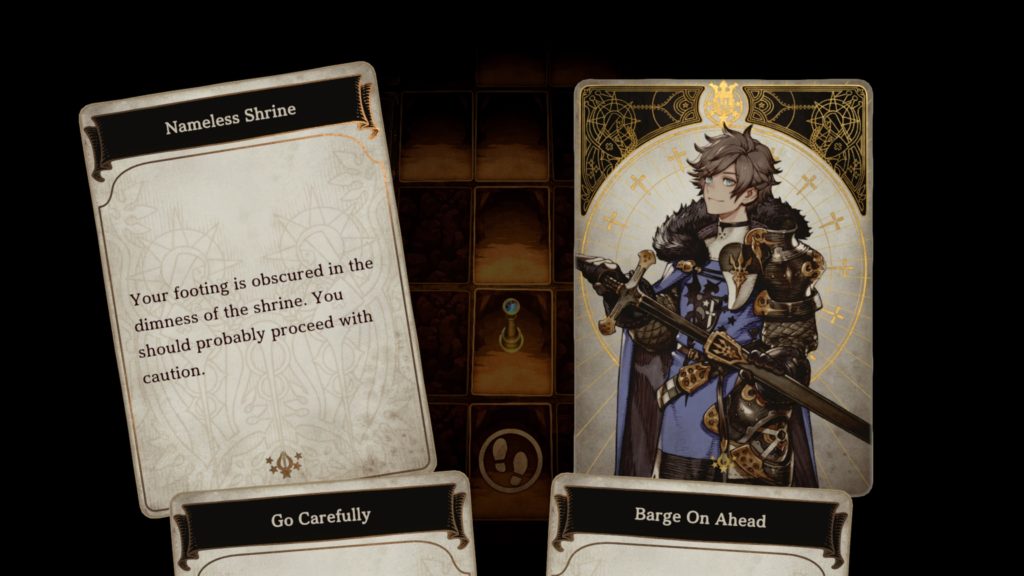
At the outset of the game, Voice of Cards’ Game Master specifically recommends that you play with the sound on and he’s not joking — the experience really is richer for it. In fact, even as someone who typically goes for the Japanese voice track when the option exists, I’d go so far as to recommend playing with the English dub on this one; to me, a significant part of the game’s impact and effectiveness comes from being able to hear and understand the story unfolding rather than simply reading it from the cards in front of you. The choice is, of course, yours, however.
For those who played the demo for Voice of Cards that came out a while back, the full version of Voice of Cards subverts expectations somewhat. While the initial tutorial unfolds from the perspective of the same “Ivory Order” adventurers that the demo focused on — in fact, it covers the exact final moments of the demo — once the main narrative gets rolling, things shift somewhat. Our perspective changes to that of an unproven adventurer and his monster companion, and the Ivory Order adventurers take on something of an antagonistic role.
This is a really interesting narrative approach, since the demo took such care to position these characters as thoroughly noble, heroic figures who were adored by everybody — though there was still a certain arrogant undertone to what they did. In the full version of Voice of Cards, this becomes abundantly clear — being in a position of power and privilege can lead to one taking one’s position for granted and not really being considerate of others, even when said position of power is based on a reputation for generosity and benevolence.
This is a Taro Yoko game, after all, so there are plenty of little bittersweet, dark and tragic touches like this along the way — often in the most subtle of places. But we’ll come back to that in a moment.
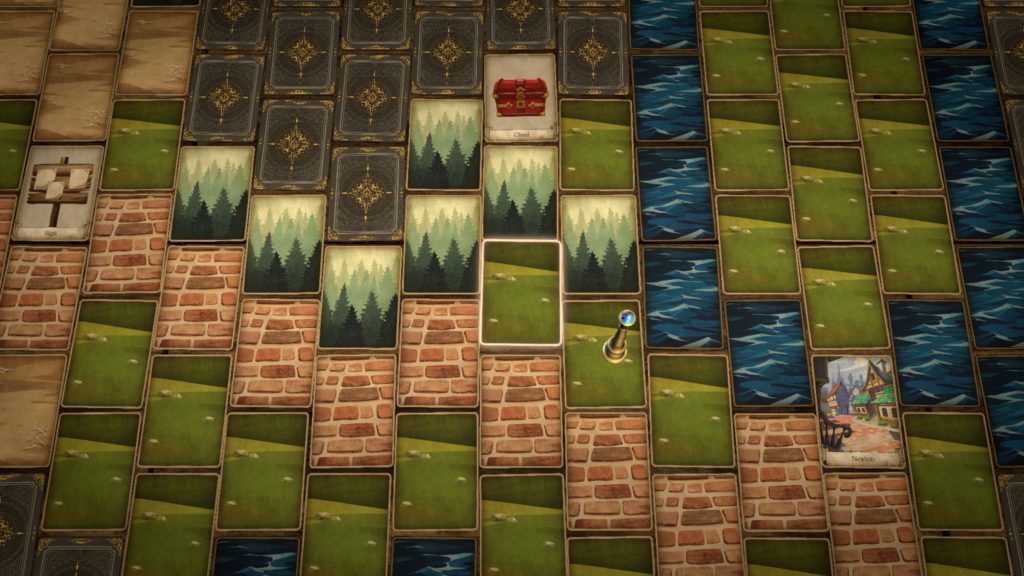
In terms of execution, Voice of Cards: The Isle Dragon Roars is the classic console-style RPG distilled down to its core elements. You move a playing piece that represents your party around the map, which is entirely constructed of cards, and reveal new areas of terrain as you move around.
Moving onto something — such as a chest, shop or character — allows you to interact with it in some way, usually prompting a short narration sequence from the Game Master, and there are often choices to make as to how you respond to various situations. At heart, the game’s narrative is strictly linear, but the fact you can respond in various ways to the situations before you gives you a greater feeling of agency.
Battles occur at random, and unfold as a competitive card game. Each participant in the fight has a card that represents them, with numerical values showing their current health, attack and defence values. When a participant’s turn rolls around, they can choose from a hand of cards they have available to them, with more powerful cards requiring they draw from a pile of crystals that gradually accumulates with each passing turn.
Some cards also require dice rolls to determine whether or not something is successful or to adjust the power factor — all of these things are represented visually.
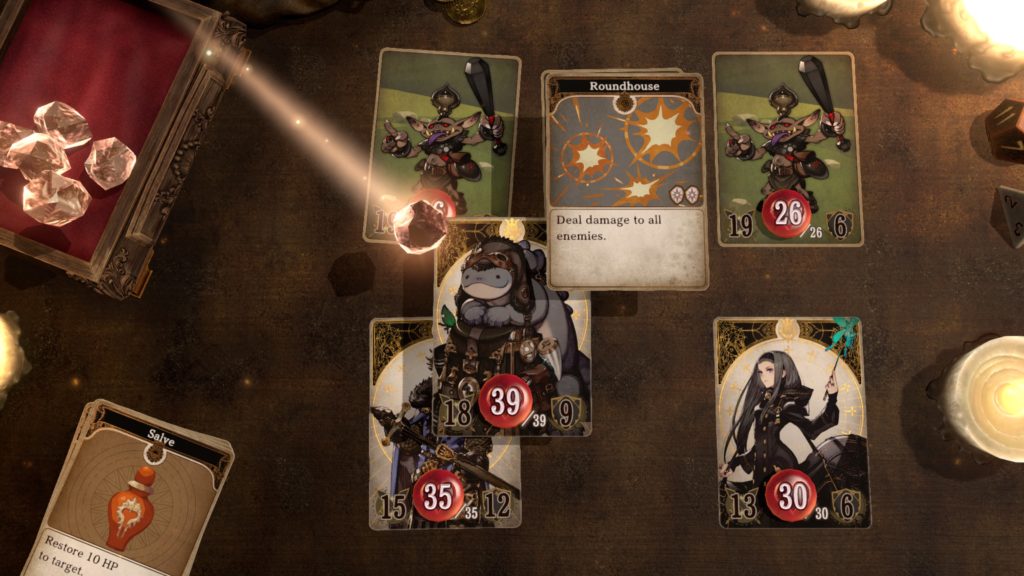
Combat is pretty easy, to be perfectly honest, and you won’t face any particularly significant challenges until towards the end of the game — but providing a tough game is not what Voice of Cards is all about. Rather, it’s about immersing you in the experience of exploring this world of imagination — always aware that the Game Master is keeping an eye on you and making sure the game runs smoothly.
In fact, the way in which the game’s odds appear heavily stacked in favour of the player is very fitting for the tabletop theming of Voice of Cards; when playing real tabletop roleplaying games such as the classic Dungeons & Dragons, the Game Master of the experience is rarely in a truly antagonistic role attempting to “defeat” the players; rather, more often than not, they simply want the players to experience the story and world they have spent time crafting while feeling as if they’ve overcome some obstacles — even if said obstacles don’t actually pose any real threat.
If that means fudging a few dice rolls or tipping the game balance in the party’s favour, so be it.
And Voice of Cards provides plenty of things about its world for you to discover — with many of these optional discoveries showing where Taro Yoko’s dark sense of humour and fascination with death truly shines.
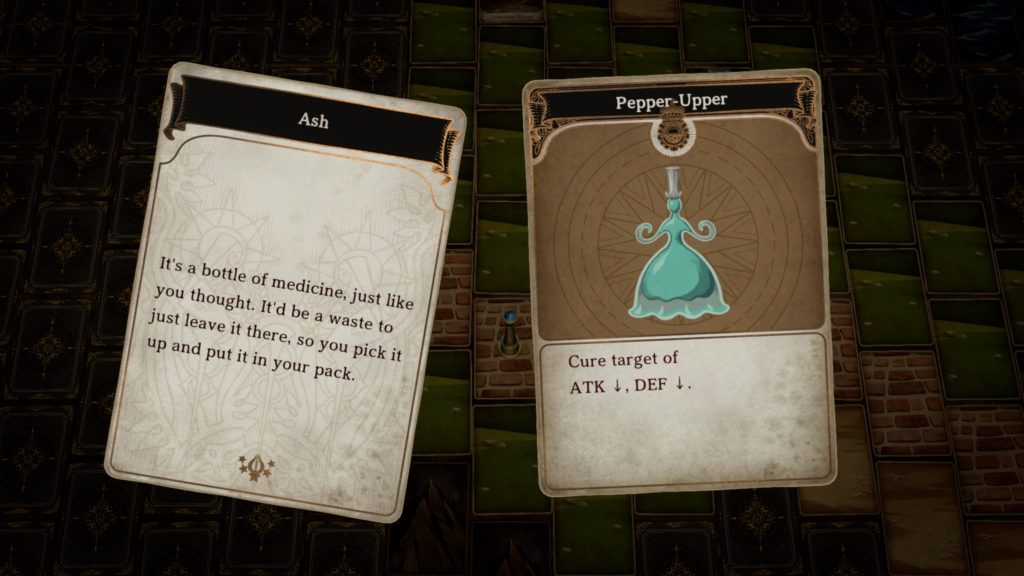
When you first encounter a character or monster in Voice of Cards, the card representing that person or thing is added to your collection, and it includes a brief bit of information about them based on obvious immediate first impressions or, in the case of monsters, popular folklore.
But by completing sidequests or defeating particular quantities of monsters, you unlock “flip side” stories on these cards, representing a deeper insight and understanding of them. More often than not, the truth behind these cards is at the very least mildly upsetting and, on more than one occasion, deeply disturbing.
It’s especially effective when the bleakness of the text is very much at odds with the cheerful artwork depicted on the card; there’s often a real sense of “I wish I’d never found that out” — but ultimately you only have yourself to blame, because you are the one who flipped that card over.
Voice of Cards: The Isle Dragon Roars probably won’t take you a ton of time to get through; it’s a mostly linear experience without much opportunity to deviate from the critical path, but that’s sort of fine — again, that’s very much in keeping with the tabletop experience, where a Game Master will often do what they can to ensure that their players stay at least vaguely on track with the story they’ve crafted.
Of course, it would be truly interesting if Voice of Cards offered the opportunity to go truly off-piste and improvisatory as in real tabletop roleplaying — but I think we’re probably still a few years off an AI-controlled Game Master who would be able to properly cope with that sort of thing.
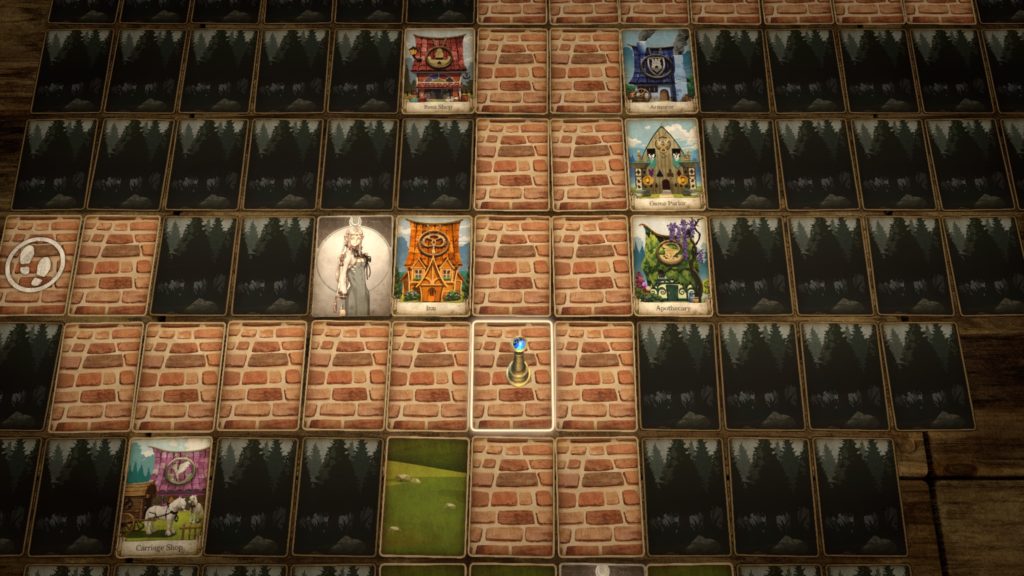
What is quite exciting about Voice of Cards: The Isle Dragon Roars is the potential for expansion in the future. The game launched with a few items of cosmetic DLC that allow you to customise the look of the cards and your playing piece as well as the background music, but it would be great to see the concept expanded in a modular fashion with additional adventures — perhaps either supporting the existing narrative and presenting alternative perspectives, or even unfolding in a completely different setting.
There’s the basis for a really solid storytelling platform here — it just remains to be seen if that is part of the long-term plan for the game, or if it was always intended to be completely self-contained. Still, in the meantime we have a satisfying, enjoyable, beautifully presented, enormously atmospheric and delightfully unconventional RPG to enjoy — so if you like the idea of virtual tabletop fun, Voice of Cards: The Isle Dragon Roars should absolutely be part of your collection.
Voice of Cards is available now for PC, Nintendo Switch and PlayStation 4.
Join The Discussion
Rice Digital Discord
Rice Digital Twitter
Rice Digital Facebook
Or write us a letter for the Rice Digital Friday Letters Page by clicking here!
Disclosure: Some links in this article may be affiliate links, which means we may earn a small commission if you make a purchase after clicking on them. This is at no additional cost to you and helps support Rice Digital!
- Letter from the Editor: passing the torch - June 30, 2023
- Super Woden GP 2 is looking promising - June 30, 2023
- Inti Creates is making a 32 bit-style Love Live action platformer - June 26, 2023






